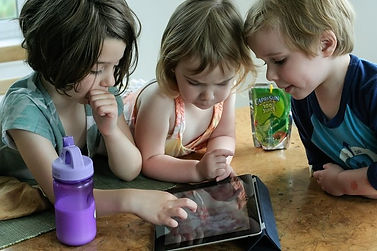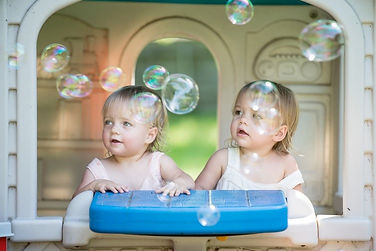
I am a regular contributor to The Conversation: a news website committed to knowledge-based journalism, where pieces are written by teams of journalists and academics who are experts in their respective fields. The pieces I’ve written for The Conversation are targeted at a general audience, but contain more research and less personal information than my blog posts.

Face Time: Here's how children learn from facial expressions
Faces and facial expressions have a special power over us as human beings. While friendly faces make us feel warm and fuzzy, those of our opponents evoke fear or even anger.
So, when do we as kids learn to recognize faces and facial expressions? And what lessons can be learned by parents whose facial signals carry a massive amount of information for infants?
Read more on The Conversation
Faces and facial expressions have a special power over us as human beings. While friendly faces make us feel warm and fuzzy, those of our opponents evoke fear or even anger.
So, when do we as kids learn to recognize faces and facial expressions? And what lessons can be learned by parents whose facial signals carry a massive amount of information for infants?
Read more on The Conversation
Face Time: Here's how children learn from facial expressions


How much screen time is good for kids?
In 2011, the American Academy of Pediatrics (AAP) released a bold recommendation: children under the age of two should not watch any television, and slightly older children should be limited to two hours of screen time per day...
This fast-growing media industry – and more specifically the growing market for children’s media – poses the inevitable questions for parents: whether screen time is bad for children and whether children can learn during screen time.
Read more on The Conversation

Children as young as four can learn how to avoid getting ill, if they understand why
Learning about illness is unlike learning about other things: it requires children to reason about objects like “germs” that they can’t see or touch.
Although children have some difficulty of grasping the concept of illness and how illness is transmitted, children begin to learn about it in the preschool years.
Read more on The Conversation

Why the new curvy Barbie is good news for your little girl
Mattel recently announced that their half-century-old centerfold would be getting a brand new look. The new Barbie will come in three different body shapes (tall, curvy and petite) and a variety of skin tones, eye colors and hairstyles...the big question is: do girls really learn about body image through playing with dolls? And if so, how is the new Barbie an important first step?
Read more on The Conversation

When do children develop their gender identity?
Gender is generally thought of as a stable trait: we are born male or female and we stay that way as we grow from small children to adults.
...how do children come to understand gender? When do they begin to think about gender as a stable trait?
Read more on The Conversation
Gender is generally thought of as a stable trait: we are born male or female and we stay that way as we grow from small children to adults.
...how do children come to understand gender? When do they begin to think about gender as a stable trait?
Read more on The Conversation
When do children develop their gender identity?


How do children learn to detect snakes, spiders, and other dangerous things?
Outdoor activities are a fun and exciting part of summertime, but they can also filled with natural (and unnatural) dangers, like fast-moving cars, steep cliffs, crashing waves and even the occasional bear...
Research shows children have an ability to detect threat quickly. How are perceptions of what’s safe and what’s threatening in the outside world shaped from an early age?
Read more on The Conversation

Stressful times are an opportunity to teach children resilience
Between the global COVID-19 pandemic, the associated economic downturn and widespread protests over racism, it’s difficult for everyone. Many people are struggling, consumed with anxiety and stress, finding ourselves unable to sleep or focus.
As a developmental psychologist and researcher on anxiety and fear in infants and young children, I have been particularly concerned about the impact of the pandemic on young people’s mental health...
Read more on The Conversation
Why can’t you remember being born, learning to walk or saying your first words? What scientists know about ‘infantile amnesia’
Whenever I teach about memory in my child development class at Rutgers University, I open by asking my students to recall their very first memories. Some students talk about their first day of pre-K; others talk about a time when they got hurt or upset; some cite the day their younger sibling was born. Despite vast differences in the details, these memories do have a couple of things in common: They’re all autobiographical, or memories of significant experiences in a person’s life, and they typically didn’t happen before the age of 2 or 3...
Read more on The Conversation
